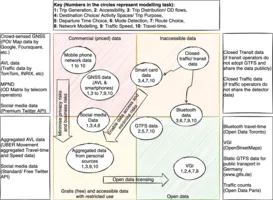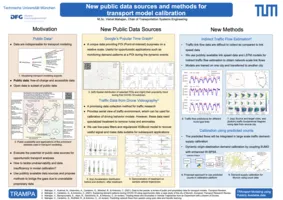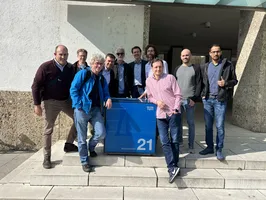- Towards automated calibration of large-scale traffic simulations. preprint_v2, 2023 mehr…
- Predicting network flows from speeds using open data and transfer learning. IET Intelligent Transport Systems 804– 824 (17), 2023 mehr…
- Treating Noise and Anomalies in Vehicle Trajectories from an Experiment with a Swarm of Drones. IEEE Transactions on Intelligent Transportation Systems , IEEE, 2023 mehr…
- Crash Risk Estimation Due to Lane Changing: A Data-Driven Approach Using Naturalistic Data. IEEE Transactions on Intelligent Transportation Systems 23 (4), 2022, 3756-3765 mehr…
- Data to the people: a review of public and proprietary data for transport models. Transport Reviews 4 (42), 2022, 415-440 mehr…
- Explaining demand patterns during COVID-19 using opportunistic data: a case study of the city of Munich. European Transport Research Review 13 (1), 2021, 26 mehr…
TraMPA - DFG project 2019
TraMPA: Transportation Modeling Using Publicly Available Data: An Evolution for Model Input Data
Duration: December 2019 – November 2022
Traditionally, transport models require a vast amount of input data, both for specifying travel demand and transport supply. On the demand side, the conventional data relies mainly on travel surveys and traffic counts. Traffic survey is an expensive exercise, whereas traffic count data suffers from limited coverage and measurement errors. On the transportation supply side, models require the creation/ specification of networks and zones, a task that traditionally has been performed manually and takes considerable time and effort.
TraMPA investigates the use of openly available data for the development of transportation models. The proposed project builds upon the ever-growing amount of data that can be obtained by a diverse number of open data sources available. The analysis will be based on different levels of open-source data availability to perform sensitivity analyses and meta-model analyses for the investigation of the model performance based on real-world scenarios.
Objectives:
- Investigate the requirements and conditions that shape the development of an Open Transport model.
- Define and evaluate the methodological framework to enable direct use of openly available data in transportation models
- Link macroscopic and microscopic transport modeling
- Validate the open transport model using traditional methods, sensitivity analysis, and meta-analysis.
- Analyze the licensing schemes for the open/ public data and provide recommendations
- Provide practical considerations during the development of the Open Transport Model
Project Illustrations
TraMPA Final Workshop: 6 - 7th October 2022, TU Munich
The workshop was organized by the project team comprising Constantinos Antoniou (Technical University of Munich, Germany), Carlos Llorca Garcia (Landeshauptstadt München, Germany; Technical University of Munich, Germany), Rolf Moeckel (Technical University of Munich, Germany) and Vishal Mahajan (Technical University of Munich, Germany). Among the external attendees were experienced and esteemed researchers in the transport modeling and data analytics domain: Greg Erhardt (University of Kentucky, US; Technical University of Munich, Germany), Haris Koutsopoulos (Northeastern University, US), Alexander Kulessa (Landeshauptstadt München, Germany), Attila Lüttmerding (Landeshauptstadt München, Germany), Gregory Macfarlane (Brigham Young University, US), Francisco Pereira (DTU, Denmark), Jan-Dirk Schmöcker (Kyoto University, Japan), and Peter Wagner (German Aerospace Center, Germany).
During the workshop, research from TraMPA project was presented by the Chair of Transportation Systems Engineering and Associate Professorship of Travel Behavior, and workshop participants provided rich feedback. External participants also presented their research and provided rich insights on applications of open and proprietary data for transport planning and modeling in research and practice. Other highlights were discussion on practical and philosophical issues related to open data, or publicly available data, need for standardized and common benchmarking datasets. TraMPa organizing team thanks all the participants for making this workshop a success.
Major Publications
Contact points:
Transportation Systems Engineering (TSE)



